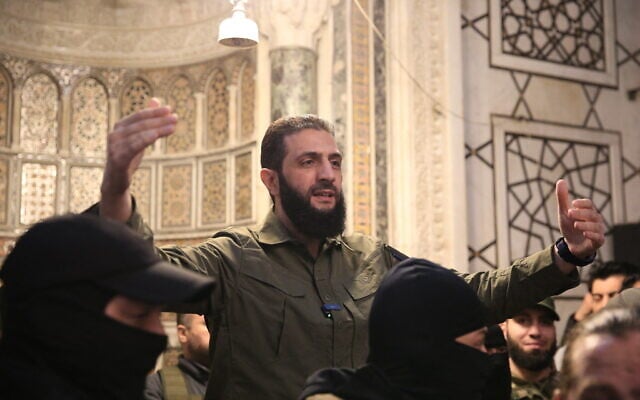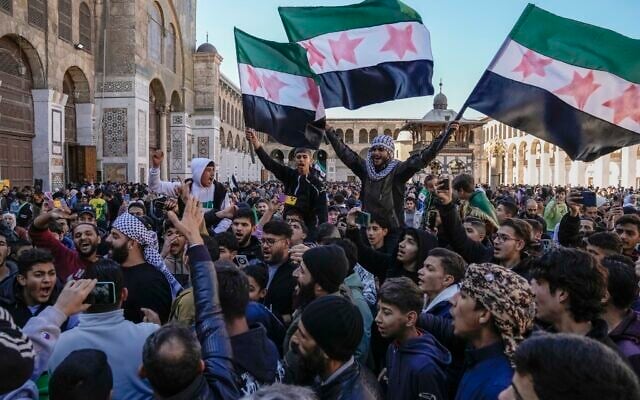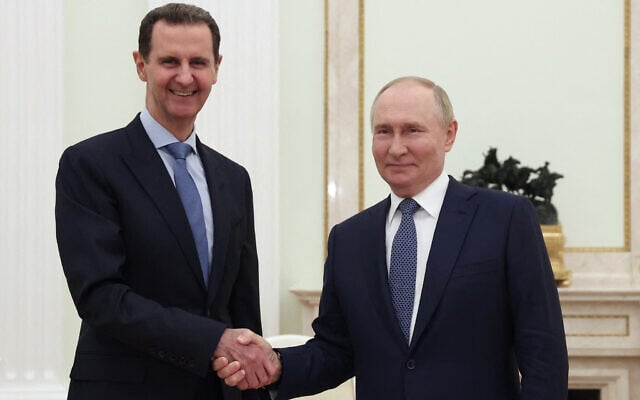Syrian rebel leader: Israel has ‘no more excuses’ to strike, we don’t seek conflict
In first comment on Jewish state since fall of Assad regime, Sharaa says Syria will seek stability after long civil war, hints at ‘diplomatic solutions’ to avert regional escalation

The leader of the Syrian Islamist rebel group Hayat Tahrir al-Sham (HTS) who spearheaded the overthrow of the Bashar al-Assad regime, spoke Saturday about Israel for the first time since taking over the country in an interview with the Syrian TV news channel.
Ahmad al-Sharaa, who is better known by his nom de guerre Abu Mohammed al-Julani, said that Israel has “no more excuses” to carry out airstrikes in Syria, and that recent IDF attacks on Syrian soil have crossed red lines and threaten an unjustified escalation in the region.
Earlier in the week, Israel launched a major operation to destroy the Syrian military’s strategic military capabilities, including chemical weapons sites, missiles, air defenses, air force and navy targets, in a bid to prevent them from falling into the hands of hostile elements.
In a move that has drawn some international condemnation, Israel also entered a United Nations-patrolled buffer zone on the Golan Heights just hours after the rebels, led by Hayat Tahrir al-Sham, took Damascus. Israel has said it will not become involved in the conflict in Syria and that its seizure of the buffer zone established in 1974 was a defensive move and a temporary one until it can guarantee security along the frontier.
The rebel leader called on the international community to assume its responsibility to avoid an escalation and guarantee the respect of Syrian sovereignty. Without directly mentioning Israel, he further spoke of “diplomatic solutions” as the only way to ensure security and stability and as a preferable option to “ill-considered military adventures.”
In a video message to the new regime taking shape in Syria, Prime Minister Benjamin Netanyahu said on Tuesday that the IDF bombed military strategic capabilities left by the Syrian military of the ousted Assad regime “so that they won’t fall into the hands of the jihadists.”
He added that Israel was ready to establish relations with the new rulers but won’t hesitate to attack if they threaten the Jewish state or allow Iran to reestablish itself in Syria.

The Assad regime was an ally of the Islamic Republic, and a part of the latter’s so-called Axis of Resistance against Israel.
“We have no intention of interfering in the internal affairs of Syria,” the premier said, “but we certainly do intend to do what is necessary to ensure our security.”
In his interview on Saturday, the new leader in Damascus appeared to indirectly respond to Israeli concerns and provide reassurance. Sharaa said that Syria is exhausted by years of civil war and that at this stage it will not be dragged into conflicts that may lead to further destruction, with reconstruction and stability the main priorities.
The rebel commander added that the Iranian entrenchment in Syria had posed a great danger to Syria itself, to neighboring countries and the Gulf, and said: “We were able to end the Iranian presence in Syria, but we are not enemies of the Iranian people.”
Over the course of a wide-ranging interview, Sharaa mentioned some of the issues that his new government will soon need to address in managing post-war Syria. He stressed the importance of abandoning the “revolutionary mentality” that propelled the rebels, and the need to establish modern institutions, guarantee the rule of law and respect the rights of all Syrians.
Sharaa delivered a scathing critique of the corrupt Assad regime, saying that it managed Syria like a “farm,” extracting and appropriating its resources to enrich itself. He added that in the upcoming period, documents will be published to prove the extent of the regime’s “enormous theft.”

He highlighted that the lightning victory of the rebels over the regime, toppled in just 11 days, proved the effectiveness of their planning and training. The rebels “took control of large cities without anyone being displaced,” he said. However, he did not conceal the fact that relations between the various rebel groups have been marked by internal conflicts, factionalism and foreign meddling.
He also mentioned the limited Russian air campaign against the rebels in the days prior to Assad’s overthrow and said it raised fears of a repeat of the Gaza scenario. With regard to future relations with Moscow, he said that the regime change offers an opportunity to re-evaluate ties in a way that serves common interests.
The previous regime came into power in 1970, when Bashar’s father Hafez al-Assad seized power in a bloodless coup. Bashar al-Assad had been president since his father’s death in 2000.
Israel and Syria do not have diplomatic relations and have formally been in a perpetual state of war since Israel declared independence in 1948.
Syria was one of a number of Arab countries that attacked the newly born Jewish state, and despite an armistice agreement signed in 1949 that demarcated a border between the two countries, Syria has never formally recognized Israel’s existence.
Syria also attacked during the 1967 Six Day War, before the IDF pounded Syrian forces and seized the Golan Heights, which Israel later annexed unilaterally. Syria attacked again in 1973 during the Yom Kippur War and was pushed back after a major advance into the Golan, after which the 1974 disengagement agreement was signed between the states, marking the demilitarized zones on the Israel-Syrian border.
While the fall of the Assad regime, which stood for over five decades, could provide a historic opportunity for recognition between Israel and its neighbor, the potential power vacuum in Syria could also lead to further chaos and serve as a breeding ground for a resurgence of terror in the region.
1 comment:
Damascus is probably the oldest continuously inhabited place on the planet. It is, I am told, a beautiful city when it isn't in the middle of a war. Its a shame that this change in leadership may not bring about any real peace or happiness for the people who live there. As that great humanitarian, Rodney King, once said, "Can't well all just get along?" Obviously, the answer is HELL NO.
Post a Comment